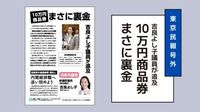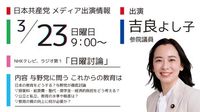On March 23, 2025, the Japanese Communist Party (JCP) is featuring significant discussions about the future of education as part of its ongoing political engagement. Yoshiko Kira, a member of the House of Councillors, will represent the party in an appearance on NHK TV and Radio 1's "Nichiyo Toron" (Sunday Debate) at 9:00 AM. This meeting will delve into pressing questions about educational reform, inspired by recent events in the region, particularly concerning labor shortages affecting school lunch programs.
Kira's engagement in NHK comes on the heels of broader discussions around education reform in Japan. As she noted during a recent speech meeting, this issue has been spotlighted by the stalling of school lunches in Nishi-Tokyo City, where some schools halted their lunch programs due to labor shortages. Such challenges highlight the broader regional issues that redound back to the national conversation concerning educational infrastructure and its resilience.
In March, Kira also attended the Nuclear Weapons Prohibition Treaty Conference, which took place at the United Nations Headquarters in New York from March 3 to March 7. Representing the JCP at this pivotal international gathering, she stressed the urgent need for nuclear disarmament and the importance of citizen involvement in treaty discussions. “This was my first time attending the Treaty Conference, and I could feel the enthusiasm to advance toward a 'nuclear-free world',” she remarked. “The treaty itself is a call for participation not only from governments but also from civil society and parliamentarians,” she stated, reflecting a sentiment of inclusivity that resonates across various layers of participation in governmental affairs.
During the conference, she and fellow JCP member Akira Koizumi delivered a joint request emphasizing the necessity of listening to atomic bomb survivors’ testimonies and strengthening efforts against nuclear deterrence. Their participation culminated in a Political Declaration that strongly asserted that "Nuclear weapons undermine the security of all States, whether they possess nuclear weapons, endorse nuclear deterrence, or strongly oppose them", bringing attention to the precarious balance of global security.
Furthermore, Kira and Koizumi handed a specific request to Akan Rafmetulin, Chairman of the Conference, asking for dedicated actions to support atomic bomb victims and to enhance collaboration among nations in the face of nuclear threats. The conference echoed calls for actionable support as a means of overcoming the specter of nuclear deterrence, positioning itself in contrast to the policies currently leveraged by nuclear powers worldwide.
Another poignant aspect of Kira's participation emerged when she highlighted the lasting impacts of the Bikini Atoll hydrogen bomb experiment on Japanese fishing communities. “On March 1, 1954, approximately 1,000 Japanese fishing boats were affected, and 30% of them belonged to Kochi Prefecture. It’s crucial that we address the needs of those who suffered as a result,” she asserted during discussions. This testimony resonated deeply with the conference attendees, illustrating how the effects of nuclear policy reverberate through generations.
The political undertone of the discussions at the treaty conference was critical; participants debated the viability of nuclear deterrence in maintaining global security. Kira emphasized, “The notion that nuclear deterrence ensures safety is increasingly being challenged. The risks inherent in any nuclear policy are catastrophically high, and we cannot afford to risk repeating the tragedies witnessed in Hiroshima and Nagasaki.”
These reflections were pivotal following the registration of 73 countries as members of the treaty, exemplifying a growing movement among nations advocating for nuclear disarmament. At the recent meeting, Kira also acknowledged the participation of global councilors, including representatives from Germany, Belgium, Norway, and Italy, observing that the policy landscape regarding nuclear weapons is increasingly becoming a matter of global collaboration and dialogue.
In the face of rising tensions, particularly regarding NATO’s nuclear posturing and threats emerging from geopolitical adversaries, Kira stressed, “The Political Declaration emerging from this conference signals a resolute commitment towards peace, advocating for dialogue and cooperation to overcome the inertia caused by deterrence.” Her statements encapsulate a call to action, emphasizing the need for integrated strategies that align diplomatic efforts with disarmament goals.
Back in Japan, the domestic conversations surrounding education reform remain urgent and pressing. Kira’s focus on the provision of school lunches in Nishi-Tokyo City reflects her broader commitment to sustainably addressing community needs. “Schools are experiencing closures in lunch services due to labor shortages. This predicament not only hampers children’s nutrition but also threatens the livelihoods of the vendors who supply these meals,” she revealed, echoing concerns that many parents and education advocates share.
With the upcoming elections on the horizon, Kira is determined to amplify her message. “The upcoming municipal elections are an opportunity to advocate for significant political change. Our vision for a better education system must be combined with our fight for nuclear disarmament—both of which are pivotal for a secure future,” Kira concluded.
Her dual focus on the educational system and pressing nuclear issues showcases a connectivity between local community needs and larger geopolitical realities facing Japan today.
As Kira prepares for her appearance on NHK and continues to engage with constituents, the JCP's agenda is becoming increasingly relevant, urging politicians to take action on matters that blend local concerns with broader global imperatives. This reflects a commitment to holistic governance that seeks to resonate with the public across various political and social spectrums.



